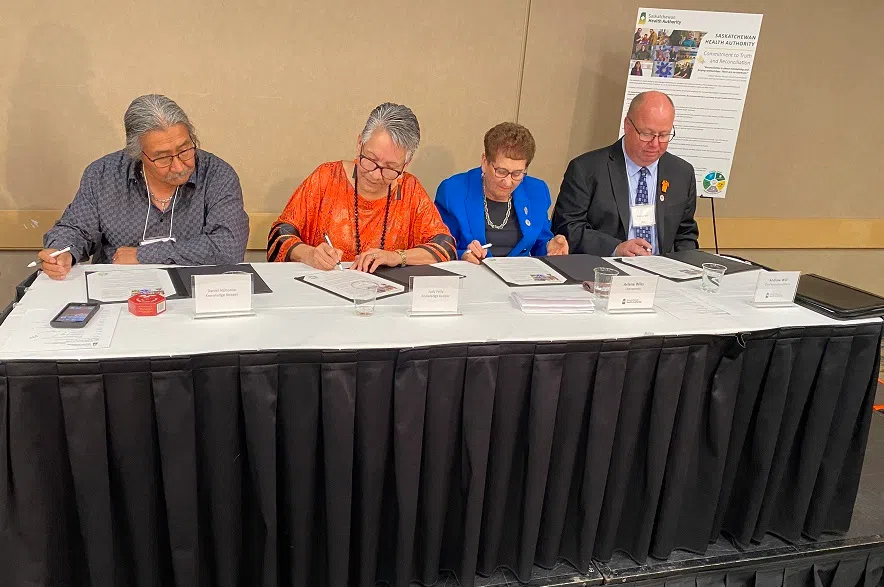The colour orange filled gallery room ‘A’ at TCU Place in Saskatoon as the Saskatchewan Health Authority reaffirmed its commitment to Truth and Reconciliation.
New documents were signed that included promises not originally made in the first commitment which was signed in 2019.
Andrew Will, CEO of the Saskatchewan Health Authority (SHA), said these new changes strengthen the pre-existing commitment.
“We made some changes to acknowledge not just the harm that was done to people in the past, but also the harm it’s caused people in the present and in the future,” he said.
Some of these changes include:
- Implementing a Traditional Knowledge Keepers Advisory Council to guide organizational initiatives;
- Increasing cultural safety and anti-racism training for staff and physicians;
- Targeted actions to increase the number of First Nations and Métis people working within the SHA;
- Implementing retention and advancement opportunities for Indigenous employees;
- Building closer partnerships with the Federation of Sovereign Indigenous Nations, Métis Nation–Saskatchewan, and other First Nations and Métis organizations.
- Changes were made based on feedback from traditional knowledge keepers.
Copies of the new documents can also be found in facilities across Saskatchewan.
Will said it was important for the SHA to reaffirm its commitment to Truth and Reconciliation.
“Our vision is healthy people, healthy Saskatchewan,” he said.
“By recommitting to our TRC commitments it allows us to really ensure we are caring for all people in Saskatchewan.”
Will said they want to close the gap between indigenous and non-indigenous healthcare workers.
READ MORE:
- First of its kind virtual health hub coming to Whitecap Dakota First Nation
- Truth and Reconciliation Legacy Fund to help charities ‘forever’
- SHA says around 500 Sask. health-care workers paid late
The first commitment was in 2019, but the SHA also recommitted in 2022. Will said commitments allow them to ensure they continued momentum in the Truth and Reconciliation work.
It’s been five years since the first commitment was made. Will said he has noticed the SHA has taken positive steps in certain areas.
“We’ve made some really good progress in areas like providing cultural responsiveness training,” Will said. “We’ve had more than 20,000 people have that training.”
Will said the new focus now is to find ways to incorporate traditional healing practices along with traditional healthcare.
Part of the SHA’s commitment is to encourage First Nations and Métis people to become health care workers.
“We want to see our healthcare teams representative of the communities we are serving,” Will said.
National Day for Truth and Reconciliation is on Monday.











